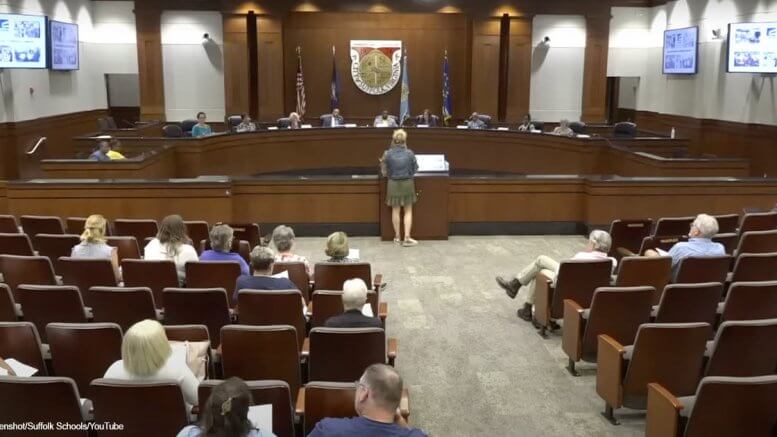In August, Virginia resident Angela Kilgore was barred from using the public comment portion of a Suffolk school board meeting to pray. The incident spiraled into weeks of pushback from other residents, the Founding Freedoms Law Center (FFLC), and First Liberty Institute, who argued that it constituted a violation of both free speech and religious freedom.
The Suffolk Public School Board did not respond to the initial letter by FFLC and First Liberty, but after the lawyers’ demand letter, the board ultimately agreed to let Kilgore pray.
Kilgore reflected on what happened in a meeting on November 9. She said, “I was met with disrespect, humiliated, kicked out.” She added that the “standard” seemed to be that the board booted whoever made comments that they didn’t like to hear. “In August, I was led by the Holy Spirit to pray for our children, schools, this board,” she continued. “[T]he chair … shut me down, but God moved.” During Tuesday’s meeting, Kilgore was finally able to pray, where she lifted up the school board and the nation.
Free speech and religious freedom were also threatened an ocean away in Finland when Parliament member Päivi Räsänen was charged with hate speech for posting Bible verses and Christian views on social media. After a roughly four-year-long investigation, Tuesday’s ruling ensued from a second attempt to censor what state prosecutor Anu Mantila deemed “intolerance toward homosexuality.” Räsänen shared that the prosecutor also compared the Bible to “Mein Kampf,” a book by Adolf Hitler. But on Tuesday, an appeals court dismissed the hate speech charges.
Both cases resulted in a win for freedom of speech and religion. However, “while we celebrate the good news, every Christian must remain aware of the Left’s continuing use of the legal system to persecute those with a biblical worldview,” Family Research Council President Tony Perkins said on “Washington Watch” Tuesday.
Kristen Waggoner, president and general counsel of Alliance Defending Freedom, added, “Simply being labeled as someone who engages in hate speech, whether you’re convicted or not, itself carries a punishment.” For Waggoner, this appeal is “a monumental victory,” but it does bring awareness to the “rise of global censorship … [which] we face here in the United States as well.”
She continued, “I do think it also points out the importance of citizens standing, though.” Although many “nations throughout Western civilization have had constitutions or laws that protect free speech [and] religious freedom,” she emphasized, “those laws aren’t worth the paper they’re written on if the citizens become apathetic or don’t enforce them.” Perkins added, “And if we don’t have people in this country willing to stand up when they’re challenged or that freedom is infringed upon, we do lose it.”
On top of that, “we lose the right of self-government, and we blur the lines with dictatorships and give totalitarian and authoritarian regimes power to silence the truth and silence debate on issues,” Waggoner warned. “So, it’s a very, very dangerous precedent.” However, despite the rising hostility, she said, “I’m hopeful about the state of religious freedom and free speech, because I do think that believers in particular are waking up to the need to stand not only for their own rights, but the rights of future generations.”
Arielle Del Turco, director of the Center for Religious Liberty at Family Research Council, commented to The Washington Stand, “These are both great wins for religious freedom. However, in situations like this, the process can itself be the punishment.” She added, “[S]imply for praying at a school board meeting or tweeting a Bible verse, there is immense “stress, emotional toll, time, expense, and reputational damage that comes with” such legal battles that “no one should face.”
As Del Turco noted, we should be grateful that both Kilgore and Räsänen “ended up with success stories,” but “these kinds of headlines can have a chilling effect on other Christians who might be intimidated from living out their faith in the public square.” She added that most people would rather avoid being “at the center of a court case.”
“Sadly,” Del Turco concluded, “Christians are going to encounter more of these situations as the culture grows more hostile to Christian beliefs. We need to ready ourselves and be strong in our faith so that we do not bend under the cultural pressure to compromise.”

